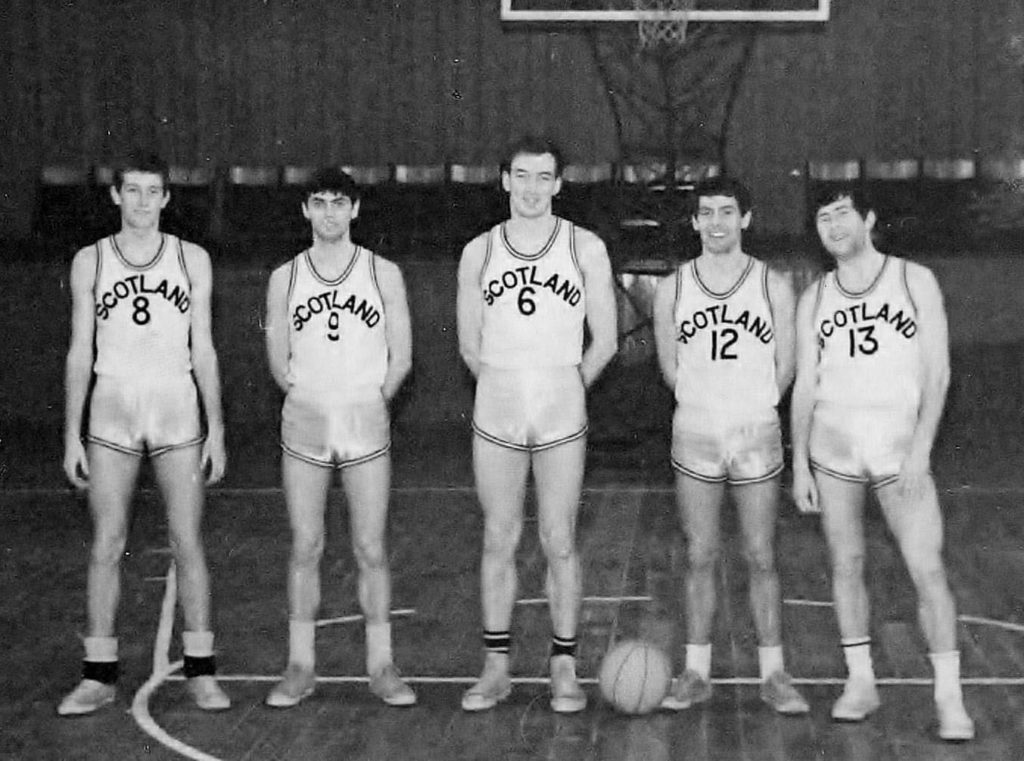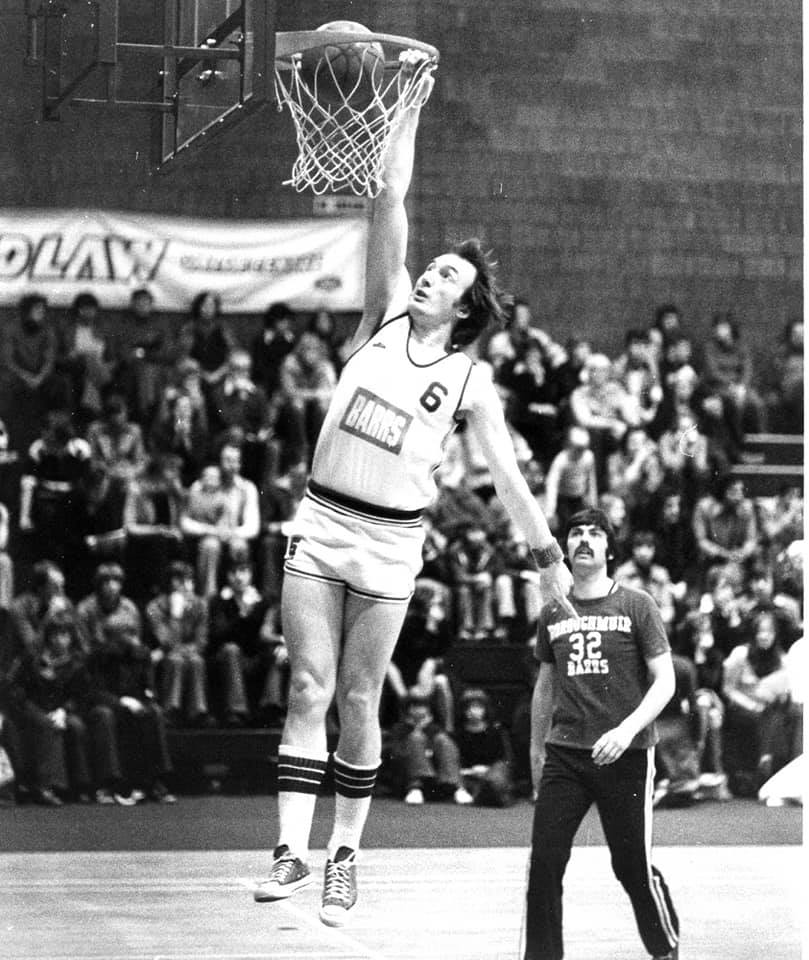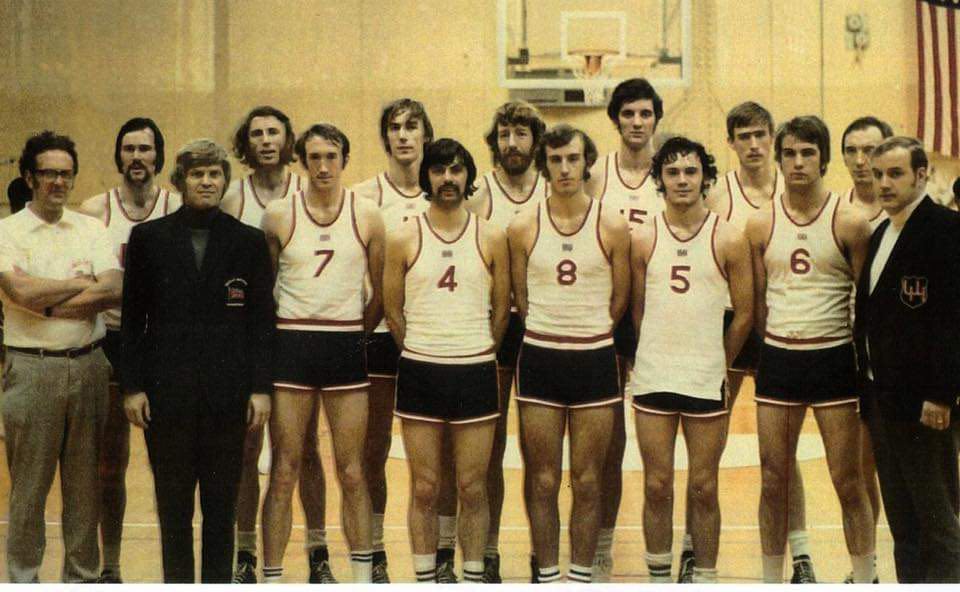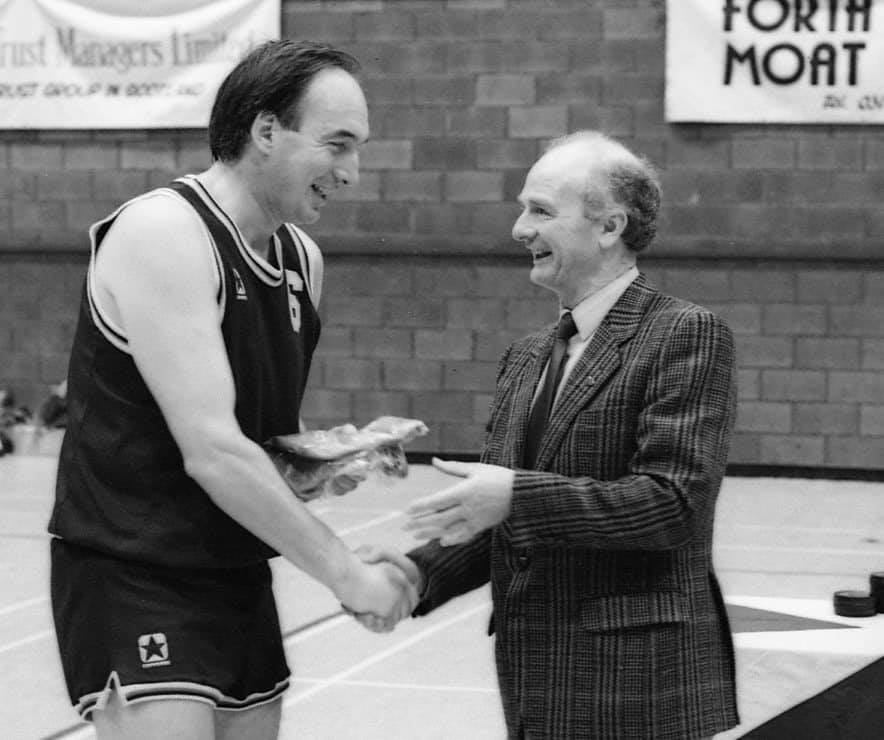Bill McInnes: “The Bobby Charlton of basketball”
In 1976, Scotland’s Bill McInnes set a British Basketball record of 49 consecutive games played for Great Britain. As Teddy Okereafor sets himself to surpass that record after 45 years, discover more about the man remembered as ‘the greatest Scotsman to ever play the game’.
Former teammates Mel Capaldi, Tony Wilson and Dave Patterson all fondly share their insights on the man they shared a court with for more than two decades. From Boroughmuir through to Scotland and GB, the players formed a bond that’s still going strong 50 years later.

Born in Edinburgh in 1945, McInnes is undoubtedly the first name in any conversation around a Scottish hall of fame. An incredible career spanning more than 20 years was followed by a relentless commitment off-court to both Broughmuir and latterly basketballscotland – serving as the federation’s Chairman for 18 years.
As a player, McInnes has been credited as the first Scot to dunk the ball. Growing up in Edinburgh, Bill was at the heart of Boroughmuir’s rise to success – an incredible story within Scottish basketball history which is highlighted by a historic European clash with basketball giants, Real Madrid.

One year after the Madrid games, on 22 March 1968, Bill’s Great Britain career began with a 74-68 defeat to West Germany.
Over the next eight years he racked up 548 points in 49 games, with a career high of 25 against Poland during the 1968 Olympic Qualifying tournament.
Incredibly, whilst the record books show Bill’s record stands at 49 consecutive games, the true figure is likely far higher.
Mel Capaldi, a regular alongside McInnes for Boroughmuir, Scotland and GB, recalls several warm-up games, tournaments and friendlies during those years – all of which contribute to an unofficial figure far greater than those in the history books:
“During that period we had various warm-up games, two official qualifying tournaments and an 18-game tour of America versus college teams. I don’t think those 18 games technically qualify for a cap, so I’m assuming that’s not included in the 49, but Bill was then involved in the 1976 one too.”
In a world pre-dating sports nutritionists, strength and conditioning coaches and all the other support staff associated with the modern game, what was the secret to Bill’s success? A lack of training, the likely answer.
“He didn’t train – he never trained. His training was playing the game. If you asked him to go to training and say you were doing shuttle runs and stuff like that, he wouldn’t appear.
“But if you were playing five games in that day he would play in all five. His main philosophy was I don’t need to train because I’m playing in games and that keeps me fit.”

Indeed, Bill’s lack of training was an inside joke that stayed with the team long after they’d stepped away from the court, Dave Patterson recalls:
“I joked at his funeral that he was allergic to training. If you were to compare him to an actor, he’s the one that never rehearsed but goes on stage and gets everything right. The basketball court was Bill’s stage.
Despite the lack of training, there was never any questions about Bill’s commitment – or ability:
“Bill was always going to be in the all-star five or in the conversation for the MVP. That was Bill. He was always there, and it was because of his shooting ability. His armour was he could shoot the ball. He wasn’t a physical guy but he could really shoot the basketball.”
A quick look back at the records show Mel’s words ring true. During the 1968 Olympic qualifying tournament Bill recorded 119 points in just seven games – long before the three-point line was introduced, too.
Tony Wilson doesn’t recall ever seeing Bill receive a technical, or even having a foul called against him. Credited with having an incredibly high basketball IQ, McInnes used his skill and artistic flair to avoid the physical side of the game whenever possible. Although, as all three teammates were quick to point out, he could give it and take it whenever it was needed.
That ability, evident for all to see from the Scottish Leagues to the international stage, was matched by another key attribute – loyalty.
Recalling a story of Bill quitting a Glasgow-based job in order to continue playing basketball in Edinburgh, Capaldi shared how Bill rejected a huge transfer to stay with his school friends at Boroughmuir.
“He was approached by Hornets. We were only youngsters, 17 or 18 and I think Bill was 20, but he was encouraged to go. They told him it was the next step to becoming a Scottish international and all that. He said no. He stayed at Boroughmuir, he stayed with his mates. I don’t know if he had the ability to see where we were going, I don’t know, but that was his best move for me. He stayed with Boroughmuir and we went on to win everything. That’s what I think of Bill as.”
Looking back, the choice was more than justified – 49 GB caps, 127 Scotland caps, competing in Europe with Boroughmuir and a historic nine consecutive Scottish Cups are the tip of the iceberg in terms of what McInnes achieved in the sport.

Furthermore, for the majority of his GB career McInnes was also selected to captain the side. Fondly remembered as a polite and well-respected gentleman off the court – a perfect role model for representing the country – Bill was never a vocal leader, Tony Wilson shares:
“The strange thing about playing with Bill is that he preferred to lead by playing an excellent game. He didn’t obviously try to take control, never tried to go one on one as much as is done these days but relied on his very a high shooting percentage.”
Leading by example was second nature, with ambitions and a winning mentality falling neatly alongside:
“Everything that he did was to get to a higher level and then move both himself and the team on. He always led by example on the court.”
With more than four decades passed since Bill’s last outing in the red, white and blue of GB, many in British Basketball – at least, outside of Scotland – will know little of the man who meant so much to so many.
For Capaldi, summarising what Bill meant to British basketball was simple: “Bill was basketball personified. He did everything for basketball. Club, international, everything. You name it, he did it.”
As a sport often found in the shadows of other sports throughout the UK, Tony Wilson believes the Bill McInnes would have undoubtedly been an icon of British sport, had the media allowed it: “If the sport had received as much exposure in the papers as football, then Bill would have been the Bobby Charlton of basketball.”
Sadly, Bill McInnes passed away in 2017 at the age of 71. A man who dedicated his life to the sport, Tony Wilson believes the lesson to be learnt from Bill is simple:
“If you love playing basketball, do it, encourage your teammates and lead by example. Be calm, polite and supportive. Bill was a friend and I do miss him.”
